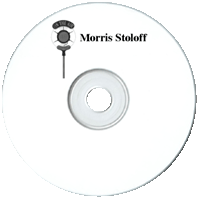

A pioneer in creating a system for bringing music to studio movies, Morris Stoloff also popularized movie soundtrack LP albums.

3 old time radio show recordings
(total playtime 3 hours, 19 min)
available in the following formats:
1 MP3 CD
or
1 Audio CDs
Text on OTRCAT.com ©2001-2026 OTRCAT INC All Rights Reserved. Reproduction is prohibited.
Morris Stoloff
(1898 – 1980)

The actor's speech was just the beginning. Music was an obvious addition to film, but creating it on the scale that Hollywood churned out films was no small undertaking. Comparing an artistic endeavor like studio movie-making to an industrial process may seem unfair, but the comparison is apt. The finished film was a product just like a car or a can of soup, and the manufacturer tried to get it out the door filled with the highest quality but as cheaply as possible.

Stoloff was one of the first classical musicians to go to work for the studios when Paramount hired him as their first concert master. He developed a system which allowed him to crank out music for projects ranging from epic dramas to comedy shorts. Columbia Pictures created a new position in the studio system for Stoloff in 1936, Musical Director, the executive responsible for musical production in every film the studio released. One of his biggest contributions was learning to work closely with producers and directors while providing individual composers, conductors, and musicians as freedom of artistic expression as possible.
Whenever Stoloff worked closely with a composer on a score he would take at least partial credit, which led to him becoming one of the most-nominated individuals in Oscar history. Bringing home "Best Score" statuettes for Cover Girl (1944), The Jolson Story (1946), and Song Without End (1960). Movie music had become such a big deal by the mid-Forties that Stoloff began recording popular numbers for Decca, and when the LP album was perfected he pioneered the release of full movie soundtrack albums.
Frank Sinatra worked closely with Stoloff on both the film and the soundtrack album for Pal Joey (1957), and when he founded Reprise Records in the early 1960s, Frank hired Stoloff as musical director. Morris Stoloff passed away on April 16, 1980, in Los Angeles, at the age of 81. A Star on the Hollywood Walk of Fame at 6702 Hollywood Blvd was dedicated to honor contributions to Recording by Morris Stoloff.
Text on OTRCAT.com ©2001-2026 OTRCAT INC All Rights Reserved. Reproduction is prohibited.
You have reached the maximum number of votes for a unregistered user.
Please login or create a new account to continue...
You have reached the maximum number to down votes in this page.



Morris Stoloff Disc A001
|
Add Audio CD to Cart - $5.00 |
Please wait...
COMMENTS
Be the first to comment on "Morris Stoloff"
Leave a comment